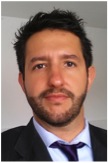Studying at the University of Verona
Academic calendar
The academic calendar shows the deadlines and scheduled events that are relevant to students, teaching and technical-administrative staff of the University. Public holidays and University closures are also indicated. The academic year normally begins on 1 October each year and ends on 30 September of the following year.
Course calendar
The Academic Calendar sets out the degree programme lecture and exam timetables, as well as the relevant university closure dates..
| Period | From | To |
|---|---|---|
| MED ING annuale | Oct 2, 2024 | Sep 30, 2025 |
| MED ING 1° semestre | Oct 2, 2024 | Dec 20, 2024 |
| MED ING 2° semestre | Jan 2, 2025 | Sep 30, 2025 |
| Period | From | To |
|---|---|---|
| Tutti i Santi | Nov 1, 2024 | Nov 1, 2024 |
Exam calendar
To view all the exam sessions available, please use the Exam dashboard on ESSE3. If you forgot your login details or have problems logging in, please contact the relevant IT HelpDesk, or check the login details recovery web page.
Academic staff
Study Plan
The Study Plan includes all modules, teaching and learning activities that each student will need to undertake during their time at the University.
Please select your Study Plan based on your enrollment year.
1° Year
| Modules | Credits | TAF | SSD |
|---|
2° Year It will be activated in the A.Y. 2025/2026
| Modules | Credits | TAF | SSD |
|---|
3° Year It will be activated in the A.Y. 2026/2027
| Modules | Credits | TAF | SSD |
|---|
4° Year It will be activated in the A.Y. 2027/2028
| Modules | Credits | TAF | SSD |
|---|
5° Year It will be activated in the A.Y. 2028/2029
| Modules | Credits | TAF | SSD |
|---|
6° Year It will be activated in the A.Y. 2029/2030
| Modules | Credits | TAF | SSD |
|---|
| Modules | Credits | TAF | SSD |
|---|
| Modules | Credits | TAF | SSD |
|---|
| Modules | Credits | TAF | SSD |
|---|
| Modules | Credits | TAF | SSD |
|---|
| Modules | Credits | TAF | SSD |
|---|
| Modules | Credits | TAF | SSD |
|---|
Legend | Type of training activity (TTA)
TAF (Type of Educational Activity) All courses and activities are classified into different types of educational activities, indicated by a letter.
Medical-surgical emergencies (It will be activated in the A.Y. 2029/2030)
Teaching code
4S01142
Credits
9
Scientific Disciplinary Sector (SSD)
-
Learning objectives
The aim of this course is to provide the students with the knowledge concerning the treatment of both medical and surgical emergencies. Particular relevance is given to the clinical-diagnostic framework of the different pathologies, in order to recognize them and to implement a proper and quick diagnosis and treatment.
The objectives of the course include the acquisitions of the knowledge regarding the main techniques of both the general and the loco-regional anaesthesia, the preparation of the patients undergoing surgical procedures, and the pathophysiology and treatment of acute and chronic pain.
Emergency Medicine Module
The module aims to lead the student to the knowledge of the main emergencies in Medicine, essential diagnostic pathways in the Emergency Department environment, and assistance and therapeutic interventions for critical patients.
Pain Therapy, Intensive Care, Anesthesiology Module
The module aims to provide the student with knowledge regarding the treatment of medical emergencies with clinical-diagnostic framing of individual pathologies, in order to provide the student with the notions to recognize, differentiate, and implement a correct and rapid diagnostic process, as well as to provide basic notions for correct cardiocirculatory and respiratory resuscitation. The individual therapeutic treatments are identified according to the context in which the physician will have to act (patient's home, territory, ambulance, emergency room, ward, resuscitation, etc.). Furthermore, the different treatments are critically proposed based on Evidence-Based Medicine. Among the objectives of the module are also the knowledge of the main anesthesiological techniques and the physiopathology and therapy of acute and chronic pain.
Emergency Surgery Module
The module aims to provide the student with knowledge regarding the treatment of surgical emergencies with clinical-diagnostic framing of individual pathologies, in order to provide the student with the notions to recognize, differentiate, and implement a correct and rapid diagnostic process leading to emergency surgical intervention. Among the objectives of the course is the knowledge of the preparation of the surgical patient both elective and emergency, in various pharmacological and medical aspects.
BIOETHICS MODULE
The module aims to develop knowledge and skills to address bioethical dilemmas, with a focus on emergency contexts to explore topics such as the duty of medical care and the assessment of the futility of care, Advance Directives and decision-making processes.
In parallel, the course intends to explore the ethical challenges associated with the adoption of advanced technologies, such as robotics and artificial intelligence, in biomedicine and biotechnology.
Examination Methods
Oral exam, in presence. In general, the student will be examined on various topics of different modules. A grade will be assigned for each subject, and these marks will be used to compute the arithmetic mean for determining the final score. BIOETHICS Module Written Multiple-Choice Examination
Evaluation criteria
The test ascertains the level of knowledge of the theoretical contents and the ability to use language in describing the contents of the program. The final grade will derive by the weighted average of the grades given in response to the different questions BIOETHICS Module Adherence to the following points. 1) Knowledge and understanding of the content and dynamics of the bioethical debate, with particular regard to the context of care and emergency. 2) Knowledge and understanding of the ethical implications of robotics and artificial intelligence in the healthcare field.
Free choice courses
Modules not yet included
Career prospects
Module/Programme news
News for students
There you will find information, resources and services useful during your time at the University (Student’s exam record, your study plan on ESSE3, Distance Learning courses, university email account, office forms, administrative procedures, etc.). You can log into MyUnivr with your GIA login details: only in this way will you be able to receive notification of all the notices from your teachers and your secretariat via email and soon also via the Univr app.

 giuseppe.bertini@univr.it
giuseppe.bertini@univr.it
 045-802-7682
045-802-7682








